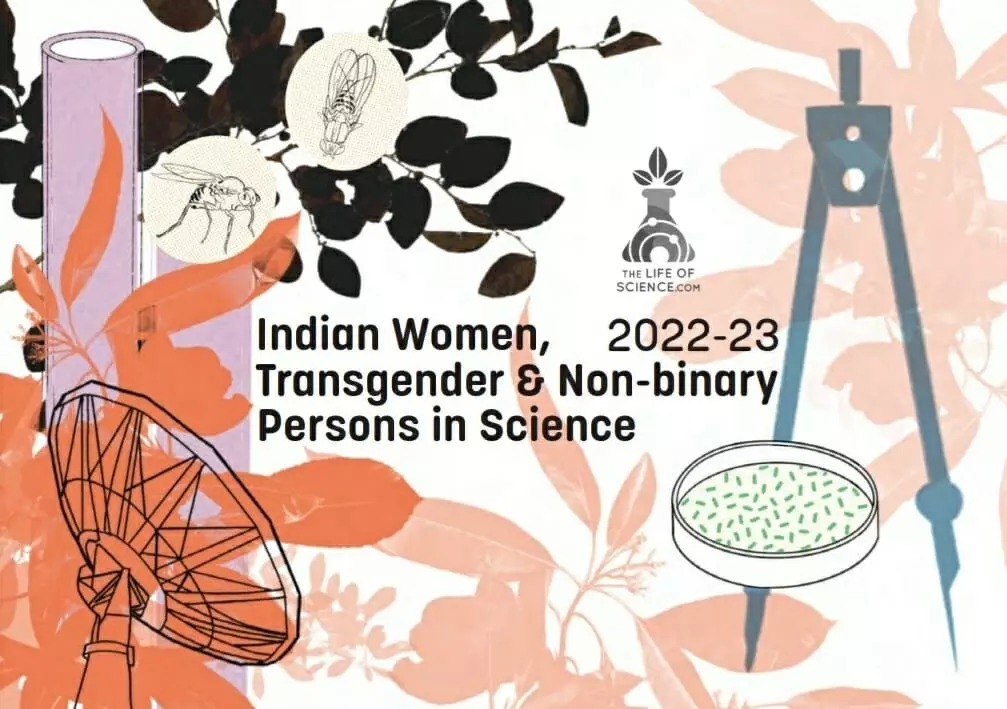'Inclusive and validating': TLoS calendar 2022-23 features women, trans, non-binary persons in science
The Indian Women, Transgender, and Non-Binary Persons in Science calendar is one of the many ways that TLoS, a feminist multimedia science collective, works towards highlighting contributions of marginalized persons, especially women, transgenders, and non-binary persons, to the Indian science ecosystem.
By Amrutha Kosuru
Hyderabad: Aqsa Shaikh, a Muslim transwoman, has been featured in the Indian Women, Transgender, and Non-Binary Persons in Science 2022-23, a 13-month calendar that is released annually on the occasion of International Day of Women and Girls in Science on 11 February. "This feels like validation," she says.
"In a world where several feminists deny transwomen the identity of women, to be featured in the company of other women, transgender, and non-binary persons feel inclusive, respectful, and validating," says Aqsa who works as a nodal officer at a vaccination centre. She is also working on 'TransCare Covid-19', a qualitative study documenting the healthcare experiences of transgender persons during the pandemic.
She says that women have spent lifetimes trying to break the glass ceiling in STEM (Science, Technology, Engineering, and Mathematics) and to see transwomen and non-binary persons forge ahead is celebratory.
The Indian Women, Transgender, and Non-Binary Persons in Science calendar is one of the many ways that The Life of Science (TLoS), a feminist multimedia science collective, works towards highlighting contributions of marginalized persons, especially women, transgenders, and non-binary persons, to the Indian science ecosystem.
"The calendar is an annual tradition for us at TheLifeofScience.com where we bring together diverse voices to showcase a more inclusive image of Indian science," says Sayantan Datta, writer and communicator at TLoS.
Some of the people featured in the calendar have fought long-drawn public health battles; some have helped the public understand how to create and process music; some have charted out the path for us to live harmoniously with other beings on the planet; some have helped us understand the lack in science and science practice — the list is really endless.
Phalguni Alladi, one of the women featured in the calendar, says she is delighted to be part of the calendar. "The thought of bringing so many women from so many diverse works is amazing," she says and adds, "The most beautiful smile which I saw was on my mother's face after she saw the calendar." Phalguni studies the role of ethnicity in determining the risk of developing Parkinson's disease using animal models at the National Institute of Mental Health and Neurosciences, Bengaluru.
Shantala Hegde, a neuropsychologist at the National Institute of Mental Health and Neuro Sciences, Bengaluru, jokes that she didn't need to lose any weight to be a 'calendar girl'. She studies music cognition from both basic sciences and clinical application perspectives. "The calendar has given me so much confidence," she says.
As a neuropsychologist, Shantala says there is a need to spread awareness regarding different disciplines that exist in the field of science apart from the usual pedagogy. "In this sense, the calendar shows the several science careers that anyone, especially women, can opt for and it is amazing," she adds.
Recognizing women, trans and non-binary persons
Sayantan says that the calendar acts as a way for the Indian science ecosystem to familiarize itself with the myriad contributions that women, transgender, and non-binary persons make to Indian science, and to find ways of building solidarities – be it through future collaborations, or appreciation of each other's work. "Finally, this is also our attempt at helping younger people in science find role models and mentors who are not cisgender heterosexual men," Sayantan adds.
The 2018, 2019, and 2020 calendars featured only cisgender women in science and featured only one woman on each page. "However, in 2021, we realised that the question of diversity and inclusion in science cannot be limited to cisgender women, and therefore, our 2021 calendar for the first time featured multiple women, transgender, and non-binary persons who have made significant contributions to the Indian science ecosystem," Sayantan explains.
They add, "This year, we tried something different. We identified several concepts as our broad themes for each page. The page for each concept — for example, neurodivergence, the pandemic, or model organisms — showcases the contributions of several people working in the field. We've tried our best to curate a diverse list of over 50 Indian women, transgender, and non-binary persons." This move was also to acknowledge a shift in the way science is practiced, where collaborations and solidarity-building are becoming more and more essential to a science practice, they say.
G.C Anupama, a professor at the Indian Institute of Astrophysics, Bengaluru, says the reach of the calendar is a lot more than the other outreach activities she does. "We really need to be proud of what we are doing. Because many of us (women, trans, and non-binary persons) are achieving things of international standards even with only the most basic facilities available," she says.
Anupama is also the current president of the Astronomical Society of India (ASI), the first woman to hold this position.
The calendar was produced by Nandita Jayaraj, Aashima Dogra, co-founders and editors of TLoS, along with Sayantan Datta and Aishwarya Viswamitra, their social media editor.
Not only does the calendar provide access to resources where one can learn about the featured persons and their work but it has been designed in such a way that it can be converted to postcards/flashcards after the month has passed. To find and read more about the women, transgenders, and non-binary persons featured in the calendar, head here.